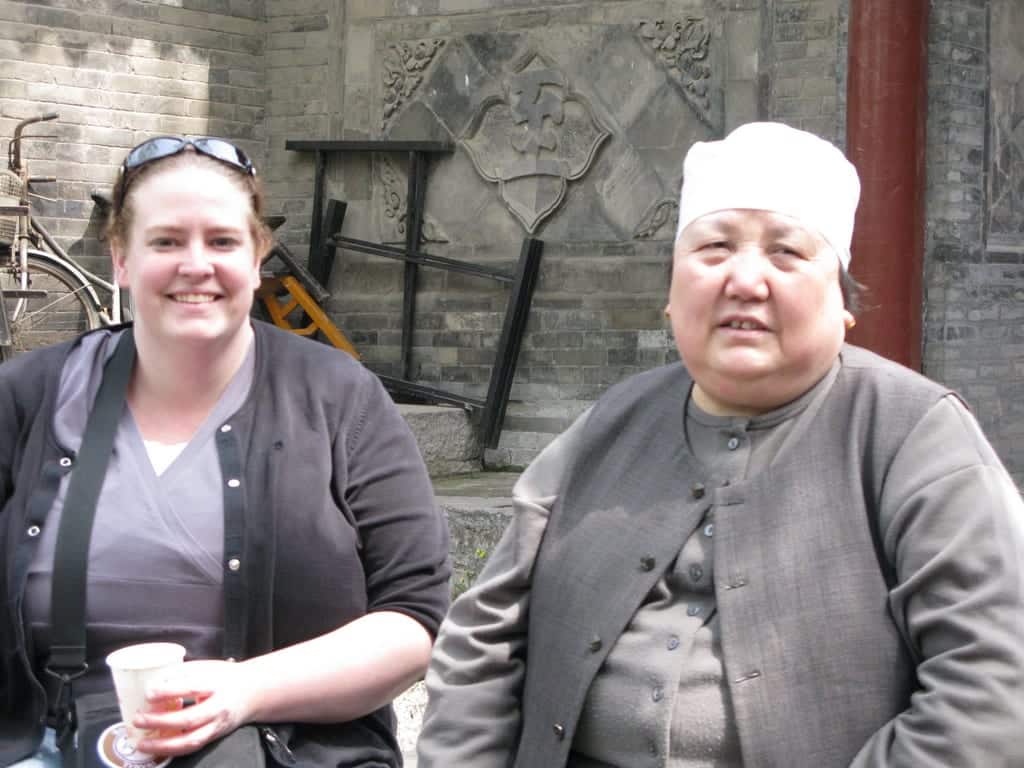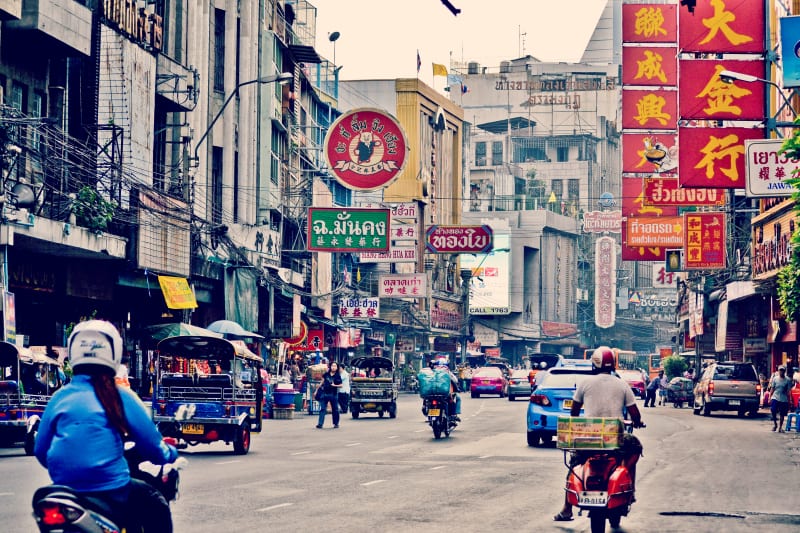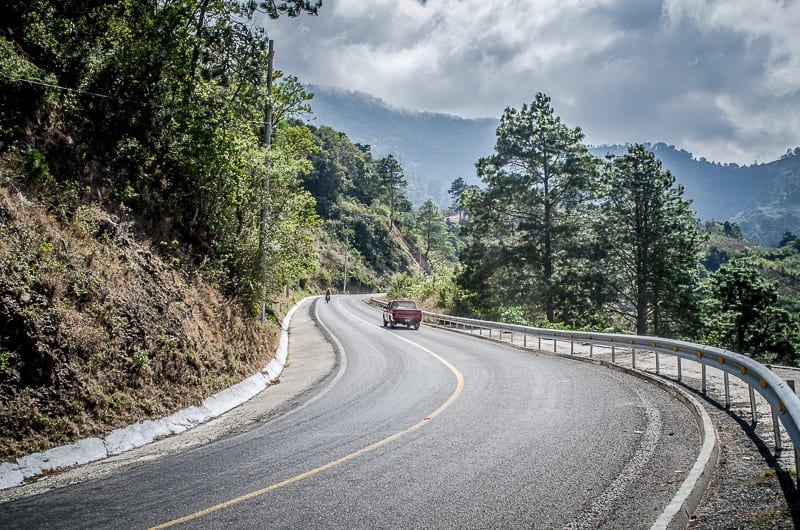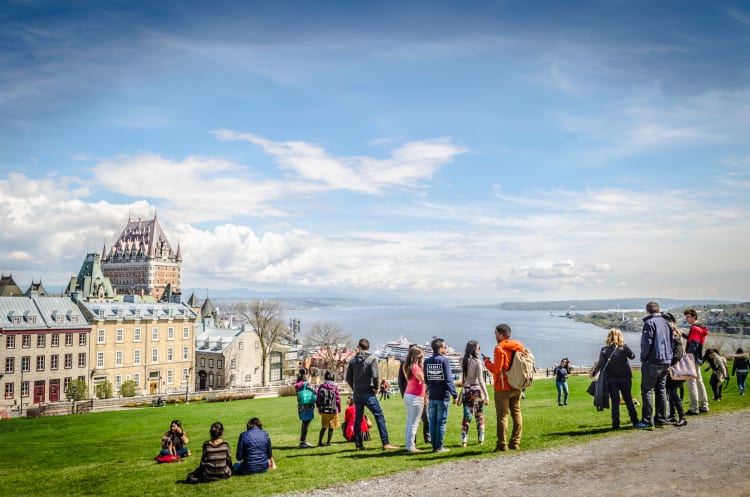Adventurous Kate contains affiliate links. If you make a purchase through these links, I will earn a commission at no extra cost to you. Thanks!
Pamela MacNaughtan of Savoir Faire Abroad was the first person I met when I started traveling the world long-term: we met on my first day in Bangkok in 2010! Years later, she’s still traveling solo, with a particular love for Asia and Québec City.
But a few months ago Pam wrote a post that rocked the travel blogging world: Confessions of an Overweight Female Traveler. It’s a subject that is rarely discussed, yet Pam brought it into the open and received such a positive response, she decided she wanted to continue talking about it. I then invited her for a Viewpoints interview to share her experiences with my audience.
Thin privilege is very real, even in the travel space, and Pam has started a valuable dialogue that we need to engage in more often.
Beyond that, Pam, who hails from Canada, is one of the more adventurous solo female travelers I know. She has done things like taking a boat from Thailand to China (yes, you can do that!) and driving from Czech Republic to Turkmenistan.
AK: I feel like criticizing or mocking people based on their weight seems to be the last taboo allowed by society. People who wouldn’t dream of making a racist or homophobic joke sometimes don’t hold back in mocking overweight people. Do you feel this is the case?
PM: I don’t see it as much in Canada as I do when I’m in America. I’m not saying it doesn’t happen, it does, I simply don’t encounter it as much. People who criticize feed off of the reactions of their victims, but also by the reactions of their peers. In society race and sexuality are becoming more accepted, and while discrimination is still prevalent, society is saying “Hey, stop being an ass, humans are humans and everyone deserves to be treated equally”. Society is fighting to stop discrimination against race and sexuality, and as such jokes are no longer tolerated.
In many ways criticism is about power and control, and the critic is fed by the reactions of not only their victims, but their peers. When their peers agree, the critic feels encouraged, powerful, it can be a rush. So, they continue criticizing in order to feel that power and control, but when their peers disagree with them, it takes that power away, the rush is gone.
Making jokes about race or sexuality is going to result in disagreement, and those jokes are silenced.
Being overweight is something we do to ourselves, it is usually within our control, and as such society is not likely to accept and defend obesity, or anorexia for that matter. It’s a critic’s dream come true. They can make jokes and their peers will laugh and encourage, they feel the power, the rush.
We’re not at a point in society where we’re saying “Hey, stop being an ass, sure she is overweight/underweight, but this person is human and they need our support”.
How do you deal with hurtful actions from other people?
I’ve developed a thick emotional skin over the years. As an overnight person I am responsible for my current weight, and it’s up to me to find ways to lose that weight. Society cannot do that for me.
In some instances I will attempt to see things from their point of view and try to understand their motives, but there are times when I get angry. On those days I fight the urge to lash out, to find the one thing that they don’t like about themselves and throw it in their face. When I get like that, I walk away, I put some tunes on and go for a walk until I calm down. If the interaction happens online, I shut down my laptop and usually end up scrubbing everything in sight until the anger and frustration goes away.
Some times I tell myself I don’t care about what has happened, and I keep telling myself that until it becomes true, and I move on.
How do you deal with flying?
I fly a lot, and I have a system. I am almost always the person hovering at the gate, waiting to get on the plane. It’s not because I think we’ll leave faster, it’s because I want to get on to test out the seatbelt and the table tray before the plane is full of people.
There are some planes that have short seat belts, and I will ask for an extension sometimes to make the flight more comfortable — something I used to feel very ashamed about. I also have massive boobs, so I like to put the tray table down to see if I will be able to actually use it; see the food tray when it’s meal time. In most cases I opt to skip the meal and usually have nuts and water with me.
When I fly I am more concerned about the other passengers. I always take a window seat as it’s easier for me to try squishing myself into the side of the plane, in an effort to make the person beside me more comfortable — apparently as an overweight person I am one of those annoying traveler whose girth makes flying uncomfortable for others; according to some of the articles I’ve seen floating around online. Most people are fine, but I have had to sit beside a few who were visibly annoyed by my presence, which can make for a long flight.
There an inconveniences when I fly, but they are minor. I have a long haul flight coming up, so I’ve paid for a bulkhead window seat, not because I’m overweight, but because the premium seat is easier, I can stretch my legs and get up whenever I want. If I need an extension, I ask for it. If the tray doesn’t work well, I have light snacks and water. Airline food is rarely delicious, so I’m not really missing out.
(Note from Kate: I will always remember this line from Pam’s original post on her site: “Feeling uncomfortable sitting beside an overweight person, chances are they are just as, if not more, uncomfortable as you.”)
You’ve spent a lot of time in China, where it’s common for foreigners to be stared at and photographed. It’s also common to comment on people’s weight, whether they’re Chinese or foreign. What was it like for you traveling there?
China is one of the hardest countries, mostly due to the difference in culture. I’ve had a few people stop me on the street and try to sell me weight loss pills, and I just smile and thank them, usually telling them that I already have some (which I don’t).
In China the attention is usually out of curiosity; it is rarely malicious. That being said, I am not a perfect traveler and some days can be harder than others. I’ve traveled through China enough to know that when I’m tired or feeling burned out, I should stay indoors until I feel better.
Going outside when I’m not at my best makes me more sensitive than usual, and there have been days when the staring, pointing, and the difficulty in finding a taxi driver has reduced me to tears.
It helps to walk around telling yourself that the locals obviously think you’re fabulous. It’s a fantasy, but I’m sticking to it.
China is challenging emotionally, but I’m enthralled by the history and beauty of the country.
You’ve traveled in destinations where obesity is very uncommon, like East Asia, and destinations where it’s more common, like Mexico and the US. Do you find you have an easier time in the latter?
I actually enjoy East Asia more. I obviously had a healthy relationship with bad foods to get to where I am today, but that doesn’t mean I have the same mindset today. In the US we have easy access to bad foods, and it can be hard to resist them. In some ways junk food and processed food is cheaper than fresh whole foods.
In Mexico I experience more acceptance for who I am as a human. I don’t feel as self-conscious there, as I do in the US. In East Asia the junk food and processed foods are generally found in western-friendly stores and can be quite pricey, so I avoid them and eat a lot of fruit and protein. I drop breads, soda, most sugars. I drink a ton of water due to the heat outside.
In many ways I live a more healthy life in East Asia, and I feel better physically and emotionally. (Note from Kate: I completely agree with this. Between the small plates, healthier and less processed food, and emphasis on massage for wellness in countries like Thailand, it’s much easier to live a healthy lifestyle in many parts of Asia.)
How can people be more compassionate to overweight travelers?
I think remembering that we are human is important.
I like to think that I am a good person. I try to be compassionate and kind. I can be fiercely loyal and usually a good listener. I’ve travelled through 38 countries as a solo female, walking everywhere I possibly can, and looking for different ways to push myself.
I stopped travelling for a year and cared for my Dad until his death, taking a job as a travel consultant when he was placed into a facility and we needed more funds. I’ve driven from Prague to Turkmenistan, road tripped through interior Mexico, traveled by boat from Northern Thailand to China.
There are so many things beyond my weight that make me, well, me, but if all you see is that I’m overweight, you’ll never know that stuff. You’ll never know what we may have in common, or whether we could become fast friends.
Look beyond the weight to the person inside. We all need kindness, understanding, support. What I need will not be the same as what you need, but that is not important, positive human contact can have a bigger impact than we realize.
You had one of the scariest travel experiences I’ve ever read about, when you drove through a protest in Chiapas, Mexico, and were attacked by a mob. Looking back, how do you feel about that experience?
That experience is forever etched in my brain, it was by far the scariest thing I have ever lived through. In the beginning I was done with Mexico, even though it wasn’t Mexico’s fault, it was ours. I wanted out and to forget about it. I never wanted to visit Chiapas again, ever. Now, I look back and realize I was being an asshat.
Chiapas appears to struggle more than other regions of Mexico, and at the time coffee plantation workers were upset over unfair treatment by plantation owners, and rightly so. In an effort to be ‘heard’, the barricaded the only major road they had, a mountain road that lead from San Cristobal de las Casas to Tapachula.
When we arrived at the protest we were tired, and frustrated as we were having difficulty getting through the border on the major highway to Oaxaca due to a lack of paperwork on the van we were driving. The mountain road was our only way home. Each of us got out and tried to ask the locals to pass through – talk about white privilege! Naturally, they said no. What happened after that still feels surreal.
They were standing up for their rights, it was of extreme importance to them, and our actions was basically telling them that we didn’t think their struggles were important. I regret that, and if I could go back and do things differently, I would try to interact with them, to learn about why they were protesting, to listen.
What kind of destinations inspire you as a traveler?
I have always been drawn to destinations that are considered more challenging. I go because I want to challenge myself, and when I arrive I discover the beauty of both the landscapes and the people, and I find inspiration in that.
Southeast Asia, and Asia in general, has a fascinating history; and the people, culture, and landscapes are fabulous as well. There is always something new and interesting around each corner. Life is simple, rustic, and it’s easier for me to go off the grid and enjoy the simple things in life.
In western culture life is high-tech and advanced, and as great as those things can be, I enjoy logging off and going back to basics.
Which destinations rank among your favorites?
Such a hard question! I have many favourites, but there are a couple that I gravitate to and miss terribly when I’m not there; Thailand and Québec City. Two completely different destinations, I know!
I have spent a lot of time in Bangkok and Chiang Mai and both feel like homes away from home. There is rarely a dull moment when I’m in Bangkok, and I still have so many neighbourhoods to explore. In Chiang Mai I can truly relax and get down to work. This is where I go to complete big writing projects, as well as to unwind. In my opinion Chiang Mai is more relaxing than an all-inclusive resort.
Québec City is full of history, yummy french food, and it feels like I’m abroad even though I am still in Canada. The city is gorgeous, no matter what time of year, and it is the only place in Canada where I actually enjoy winter. (Note from Kate: Québec City in winter is like a fairy tale! And this is coming from a fellow winterphobe.)
What is your favorite safety tip to pass on to female travelers?
Be aware and listen to your inner voice. I have never used a doorstop at a hotel because if I don’t feel safe when I am checking in, I go somewhere else. When it comes to safety, I don’t take unnecessary risks.
There is a hostel that I stay with in Bangkok, which I adore. I can take the BTS train and then walk about 10 minutes, but at night part of the route is very dark and quiet. It makes me nervous, so I take a taxi after dark. I don’t take a taxi because it’s known to be unsafe, I do it because it makes me feel safe.
If a man gets to close and you feel uncomfortable, walk away; if you can’t, start yelling at him, draw attention to yourself and your situation. In most cases they back off. As a woman with ginormous boobs I have done this a couple times, and it’s worked for me.
As a woman, I use my bra like it’s a safe. I keep my credit card and cash in a little pouch and stick it in my bra. I may not feel a pickpocket, but I sure as hell will feel someone digging into my bra!
My biggest tip though is to not become so fanatical about safety that you end up sheltering yourself to the point where fear overshadows your travels.
Thank you, Pamela!
Do you know an independent female traveler with a unique story to share? Email me with the subject “Viewpoints.”





